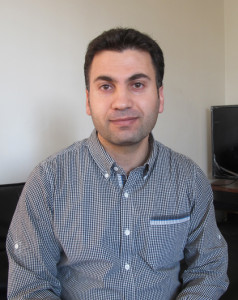Syrian refugees between a rock and a hard place

Kifarkis Nissan, 38 year old refugee from Syria.
As civil war engulfed his homeland in 2012 Syrian refugee Kifarkis Nissan’s call up for army service left him with an appalling choice; join the military and risk his family being killed by rebel militias – or refuse to serve and be jailed.
Instead, Mr Nissan took a third option – he fled his homeland and found relative safety in a refugee camp in Lebanon.
Now settled in Melbourne Mr Nissan says he is one of the lucky ones to have found a safe place to rebuild his life.
“There are still four million people displaced from Syria. My family and I are very lucky to be here in Australia,” he said.
As Christians, Mr Nissan and his family were in grave danger as Islamic State (ISIS) took control of vast swathes of the Syrian countryside.
They were part of an Assyrian Christian community living in more than 30 villages strung out along the Khabur River in northern Syria close to the border with Turkey.
It is an area that until very recently was controlled by ISIS. The villages are now empty and their 30,000-or-so inhabitants have either fled or been killed.
“They burned down all our churches, they kidnapped people. It was a terrible time for us,” Mr Nissan said.
He said that in February this year ISIS again attacked the Assyrian villages killing many and kidnapping hundreds more.
“They were asking ransom of $US10,000 per person when an average salary is about $US100 a month. So it was impossible for people to pay,” Mr Nissan said.
The former agricultural engineer says Christians and other minority groups were caught in the middle when fighting erupted between government forces, ISIS and other rebel militias.
“Christians were out on a limb. We were not with the government; we were not with the rebels and everyone discriminated against us. Often we didn’t know which group the people threatening us were from,” he said.
“I did not want to take sides; I did not want to take up weapons so when I got the letter from the army saying I must join them it put me in a very bad position.
“Where we live there are rebel groups who oppose the army, so if I joined the army I would have been leaving my family in danger. If I didn’t join, the army would come for me,” Mr Nissan said.
The day he received the letter and realising the invidious position he was in, he took his family across the border into Lebanon.
But Mr Nissan still has family members in refugee camps in Lebanon and others struggling to survive in neighbouring countries.
He says he is very grateful to the Australian Government for taking an extra 12,000 refugees from the Syrian conflict.
“The Australian Government is protecting refugees and that is good. We have the chance to build a new life and our children will be safe and they can get an education. We are very grateful for these things,” Mr Nissan said.
Studying English and getting work are now priorities for the 38-year-old.
“We want to work and serve this country because this country is protecting us,” Mr Nissan said.
“We feel welcome here. People respect out religion and culture. We feel equal and that gives me encouragement,” he said.
Laurie Nowell
AMES Australia Senior Journalist












